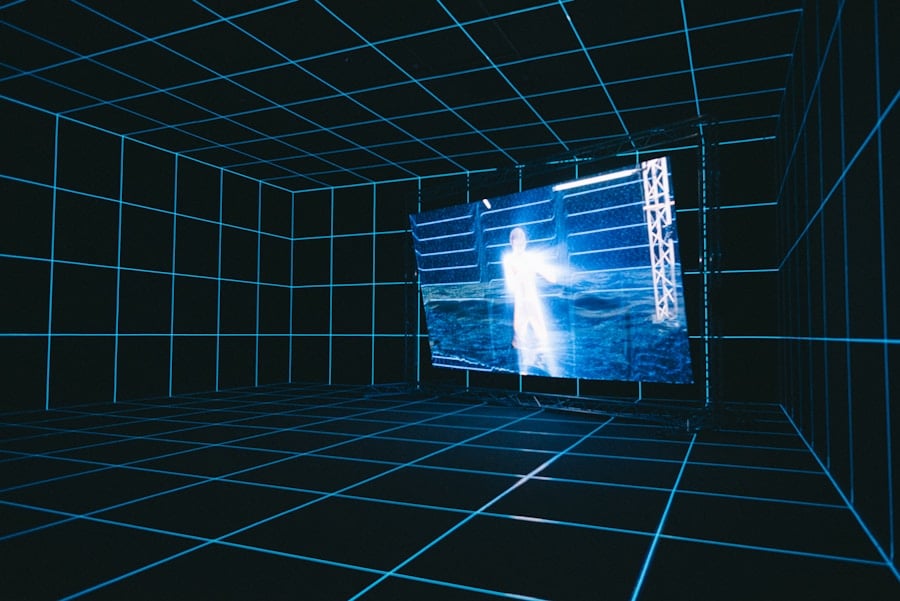The integration of artificial intelligence (AI) into home theater systems and entertainment customization has revolutionized the way consumers experience media.
The modern home theater is no longer just a collection of high-definition screens and surround sound systems; it is an intelligent ecosystem that learns from user preferences and adapts accordingly.
This transformation is not merely about convenience; it represents a fundamental shift in how we engage with entertainment. AI’s influence in this domain is multifaceted, encompassing everything from content curation to system automation. With the ability to analyze vast amounts of data, AI can discern patterns in user behavior, preferences, and even mood, allowing for a tailored entertainment experience.
For instance, AI algorithms can recommend movies or shows based on previous viewing habits, ensuring that users are always presented with options that resonate with their tastes. This level of personalization not only enhances user satisfaction but also fosters a deeper connection between the viewer and the content being consumed.
Key Takeaways
- AI is revolutionizing home theater and entertainment customization by offering personalized content recommendations and smart home theater control.
- AI advancements are enhancing audio and video quality, providing a more immersive entertainment experience at home.
- AI is also impacting virtual reality and augmented reality experiences, making them more interactive and engaging for users.
- Home theater design and layout optimization are being driven by AI, creating a more optimized and personalized viewing experience.
- The future of AI in home theater includes advancements in security and privacy, ensuring a safe and secure entertainment environment for users.
- Overall, AI has the potential to transform home entertainment by offering personalized, immersive, and secure experiences for users.
The Role of AI in Personalized Content Recommendations
One of the most significant contributions of AI to home entertainment is its ability to provide personalized content recommendations. Streaming services like Netflix, Hulu, and Amazon Prime Video utilize sophisticated algorithms that analyze user behavior to suggest films and series that align with individual preferences. These algorithms consider various factors, including viewing history, genre preferences, and even the time of day when content is typically consumed.
By leveraging machine learning techniques, these platforms continuously refine their recommendations, ensuring that users are presented with increasingly relevant options. For example, if a user frequently watches science fiction films featuring strong female leads, the AI can identify this pattern and recommend similar titles that fit this niche. Moreover, AI can also take into account external factors such as trending shows or newly released content that aligns with the user’s interests.
This dynamic approach to content curation not only enhances the viewing experience but also encourages users to explore genres they may not have considered otherwise. The result is a more engaging and satisfying entertainment journey that keeps viewers coming back for more.
AI Integration for Smart Home Theater Control

The integration of AI into smart home theater control systems has transformed how users interact with their entertainment setups. Voice-activated assistants like Amazon Alexa, Google Assistant, and Apple Siri have become central to this evolution, allowing users to control their home theaters with simple voice commands. This hands-free approach not only adds convenience but also enhances accessibility for individuals who may have difficulty using traditional remote controls.
AI-driven smart home systems can learn user preferences over time, adjusting settings such as lighting, sound levels, and screen brightness based on specific activities. For instance, when a user commands their system to “start movie night,” the AI can automatically dim the lights, lower the shades, and adjust the audio settings to create an optimal viewing environment.
Furthermore, these systems can integrate with other smart devices in the home, creating a seamless ecosystem where entertainment is just one aspect of a fully automated living space.
Advancements in AI for Audio and Video Enhancement
AI has made significant strides in enhancing audio and video quality within home theater systems. Advanced algorithms can analyze video content in real-time to optimize resolution, color accuracy, and frame rates. For instance, technologies like AI upscaling utilize machine learning to enhance lower-resolution content to near-4K quality by predicting pixel values based on surrounding pixels.
This results in sharper images and improved detail without requiring the original content to be remastered. In terms of audio enhancement, AI-driven technologies can analyze sound profiles and adjust audio settings dynamically based on the content being played. For example, during an action-packed scene in a movie, the system can automatically boost bass levels for explosions while ensuring dialogue remains clear and intelligible.
Additionally, AI can help create immersive soundscapes by simulating surround sound effects even in setups that do not have multiple speakers. This capability allows users to enjoy a cinematic experience without needing extensive audio equipment.
The Impact of AI on Virtual Reality and Augmented Reality Experiences
The intersection of AI with virtual reality (VR) and augmented reality (AR) has opened new avenues for immersive entertainment experiences within home theaters. AI plays a crucial role in creating realistic environments and interactions in VR applications by analyzing user movements and adapting the virtual world accordingly. For instance, AI algorithms can track a user’s gaze and adjust the focus of virtual objects in real-time, enhancing the sense of presence within the virtual space.
In AR applications, AI can recognize real-world objects and overlay digital information seamlessly onto them. This capability allows for interactive experiences where users can engage with both physical and digital elements simultaneously. For example, an AR-enabled home theater could allow viewers to access additional information about actors or scenes while watching a movie simply by pointing their device at the screen.
This blend of reality and digital enhancement creates a richer narrative experience that captivates audiences in ways traditional media cannot.
AI-driven Home Theater Design and Layout Optimization

The design and layout of home theaters have also benefited from AI advancements. Utilizing machine learning algorithms, designers can analyze room dimensions, furniture placement, and acoustic properties to create optimal layouts for sound and visual performance. By inputting specific parameters such as room size and intended use (e.g., movie watching versus gaming), AI can generate design recommendations that maximize both comfort and functionality.
For instance, an AI-driven design tool might suggest specific speaker placements based on room acoustics to minimize sound distortion while maximizing audio clarity. Additionally, these tools can help homeowners visualize different configurations through augmented reality applications, allowing them to see how various setups would look before making any physical changes. This level of precision not only enhances the aesthetic appeal of home theaters but also ensures that every element is strategically placed for an immersive viewing experience.
The Future of AI in Home Theater Security and Privacy
As home theaters become increasingly integrated with smart technology, concerns regarding security and privacy have emerged as critical considerations. AI has the potential to address these issues by implementing advanced security measures that protect user data while ensuring seamless operation of smart devices. For example, AI-driven security systems can monitor network traffic for unusual activity or potential breaches, alerting homeowners to any suspicious behavior.
Moreover, privacy concerns related to voice-activated assistants are being addressed through AI algorithms that prioritize user consent and data protection. These systems can be designed to process voice commands locally rather than sending data to cloud servers, thereby minimizing exposure to potential data breaches. As consumers become more aware of privacy issues, the demand for secure smart home solutions will likely drive further innovation in AI technologies aimed at safeguarding personal information while maintaining convenience.
The Potential of AI in Transforming Home Entertainment
The potential of AI in transforming home entertainment is vast and continues to expand as technology evolves. From personalized content recommendations to smart home theater control and immersive experiences in VR and AR, AI is reshaping how we engage with media in our homes. As advancements continue to emerge in audio-visual enhancement, design optimization, and security measures, consumers can expect an increasingly sophisticated entertainment landscape that caters to their unique preferences and needs.
The future promises even greater integration of AI into home theaters, paving the way for experiences that are not only more enjoyable but also more intuitive and secure. As we embrace these innovations, it becomes clear that AI is not just a tool for enhancing entertainment; it is a catalyst for redefining how we connect with stories and experiences in our everyday lives.
In addition to exploring the future of AI in home theater and entertainment customization, readers may also be interested in learning about the potential of conversational commerce. This article on conversational commerce delves into how AI-powered chatbots and voice assistants are revolutionizing the way consumers interact with brands and make purchases. By leveraging the power of natural language processing and machine learning, businesses can provide personalized and seamless shopping experiences for their customers. This innovative technology has the potential to transform the e-commerce landscape and enhance customer engagement.
FAQs
What is AI in home theater and entertainment customization?
AI in home theater and entertainment customization refers to the use of artificial intelligence technology to personalize and optimize the home entertainment experience. This can include AI-powered voice control, content recommendations, and automated adjustments to audio and video settings.
How does AI enhance the home theater experience?
AI enhances the home theater experience by providing personalized recommendations for movies, TV shows, and music based on individual preferences. It can also automate the optimization of audio and video settings for the best viewing and listening experience.
What are some examples of AI in home theater and entertainment customization?
Examples of AI in home theater and entertainment customization include smart speakers with voice assistants, such as Amazon Alexa or Google Assistant, that can control the home theater system. AI-powered content recommendation algorithms, like those used by streaming services, also fall into this category.
What are the potential benefits of AI in home theater and entertainment customization?
The potential benefits of AI in home theater and entertainment customization include a more personalized and convenient entertainment experience, as well as the ability to automate and optimize audio and video settings for the best quality.
Are there any privacy concerns related to AI in home theater and entertainment customization?
There may be privacy concerns related to AI in home theater and entertainment customization, particularly regarding the collection and use of personal data for content recommendations and voice control. It’s important for users to be aware of the privacy policies and settings of the AI technology they use.

